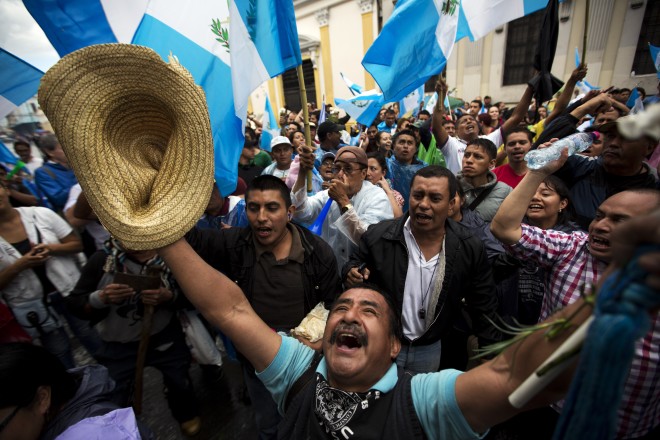
Human Rights Watch Film Festival is thundering back to the BARBICAN, BRITISH MUSEUM and PICTUREHOUSE CENTRAL with a fresh and resonant array of award-winning features and documentaries that showcase shifting attitudes to Human Rights around the world today. In a programme that highlights “courageous resilience in challenging times” we hear from Chinese migrant workers; a teenager from Hong Kong; internet sleuths; the indigenous Mayan population in Guatemala; elderly women revealing historic sexual exploitation; a female squash player from Pakistan. All these films celebrate collective action and revolutionary voices, and activists’ triumph over oppression.
The Festival will open on 9 March at Picturehouse Central with Raoul Peck’s powerful I Am Not Your Negro and close on 17 March at the Barbican, with Zaradasht Ahmed’s immersive and uncompromising Nowhere to Hide, a first person account from a male nurse in one of the world’s most dangerous and inaccessible areas, Jalawla in Iraq.
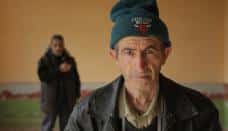 Ivan is The Good Postman who is running for mayor and campaigning to bring life to his ageing and increasingly deserted Bulgarian village, by welcoming refugees and their families to settle there. With warmth, humour and humanity, the filmmaker Tonislav Hristov’s often surreal documentary, set in a forgotten village on a route for asylum seekers making their way through Europe, provides valuable insight into the evolving discussions that dominate international politics.
Ivan is The Good Postman who is running for mayor and campaigning to bring life to his ageing and increasingly deserted Bulgarian village, by welcoming refugees and their families to settle there. With warmth, humour and humanity, the filmmaker Tonislav Hristov’s often surreal documentary, set in a forgotten village on a route for asylum seekers making their way through Europe, provides valuable insight into the evolving discussions that dominate international politics.
With uninhibited access Shimon Dotan’s The Settlers cracks open the world of Jewish settlers in the occupied West Bank: their daily lives, their worldviews, and their position within Israel. The film captures the casual zealotry, racism, and untroubled certainty of many settlers in this contentious and controversial space. Dotan lays out the facts with extraordinary care and lucidity, allowing viewers to see the progression of actions and reactions that have led to the current volatile situation.
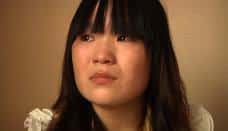 Two festival titles give pause for thought regarding the human cost of people’s dependence on electronic devices and the Internet. Heather White and Lynn Zhang will present the world premiere of their film Complicit, which follows factory workers harmed by exposure to chemicals in their work as they fight the Chinese electronics giant Foxconn. Led by migrant worker, Yi Yeting, who is struggling to survive his own work-induced leukaemia, he equips and empowers other sick factory workers to try to save lives and improve working conditions for millions of Chinese people, in the process confronting some of the world’s most profitable and recognised brands, among them Apple and Samsung.
Two festival titles give pause for thought regarding the human cost of people’s dependence on electronic devices and the Internet. Heather White and Lynn Zhang will present the world premiere of their film Complicit, which follows factory workers harmed by exposure to chemicals in their work as they fight the Chinese electronics giant Foxconn. Led by migrant worker, Yi Yeting, who is struggling to survive his own work-induced leukaemia, he equips and empowers other sick factory workers to try to save lives and improve working conditions for millions of Chinese people, in the process confronting some of the world’s most profitable and recognised brands, among them Apple and Samsung.
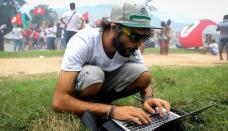 Ideas of citizenship, privacy, and democracy are challenged to the very core in Nicholas de Pencier’s gripping Black Code. Based on Ronald Deibert’s book of the same name, the film follows international cyber stewards from the Toronto-based group Citizen Lab, who have documented how exiled Tibetan monks are attempting to circumvent China’s surveillance apparatus; Syrian citizens have been tortured for Facebook posts; Brazilian activists are using social media to livestream police abuses; and Pakistani activists have opposed online campaigns for violence against women.
Ideas of citizenship, privacy, and democracy are challenged to the very core in Nicholas de Pencier’s gripping Black Code. Based on Ronald Deibert’s book of the same name, the film follows international cyber stewards from the Toronto-based group Citizen Lab, who have documented how exiled Tibetan monks are attempting to circumvent China’s surveillance apparatus; Syrian citizens have been tortured for Facebook posts; Brazilian activists are using social media to livestream police abuses; and Pakistani activists have opposed online campaigns for violence against women.
Individual and collective voices are heard in three documentaries from Hong Kong, Guatemala and Egypt. Joshua: Teenager vs. Superpower, which just won the audience award for World Cinema documentary at Sundance 2017 – follows Hong Kong’s most dissident teenager, Joshua Wong, now 20-years-old. Since 2011, Wong has rallied thousands of students to occupy the streets. Following teargas attacks, multiple arrests and an exhausting 79-day campaign to shut down Hong Kong’s financial district, Joshua moves on to the next phase of the movement – facing down the superpower from inside the government itself.
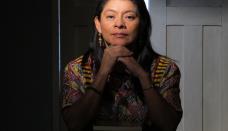 Pamela Yates’ gripping 500 Years documents the first trial in the history of the Americas to prosecute the genocide of an indigenous people, in this instance the majority Mayan population of Guatemala. Threatening the powerful and empowering the dispossessed, the trial exposed a world of brutality, entrenched racism and impunity, subverting the historical narrative of Guatemala.
Pamela Yates’ gripping 500 Years documents the first trial in the history of the Americas to prosecute the genocide of an indigenous people, in this instance the majority Mayan population of Guatemala. Threatening the powerful and empowering the dispossessed, the trial exposed a world of brutality, entrenched racism and impunity, subverting the historical narrative of Guatemala.
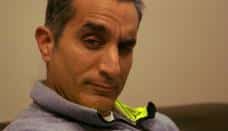 In Tickling Giants, the director Sara Taksler follows Bassem Youssef (known as “the Egyptian Jon Stewart”) who in the midst of the Egyptian Arab Spring changed his career path from heart surgeon to full-time comedian. In a country where freedom of speech is becoming increasingly restricted with each regime change, Youssef and his courageous staff of young writers develop creative methods to non-violently challenge abuses of power. Enduring physical threats, protests, and legal action, the team members test how far they can take the joke.
In Tickling Giants, the director Sara Taksler follows Bassem Youssef (known as “the Egyptian Jon Stewart”) who in the midst of the Egyptian Arab Spring changed his career path from heart surgeon to full-time comedian. In a country where freedom of speech is becoming increasingly restricted with each regime change, Youssef and his courageous staff of young writers develop creative methods to non-violently challenge abuses of power. Enduring physical threats, protests, and legal action, the team members test how far they can take the joke.
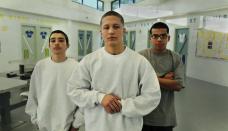 In Ben Lear’s powerful documentary They Call Us Monsters, Juan, Jarad and Antonio, ages 14-16, face decades in prison in California, where juveniles older than 14 can be tried as adults for violent crimes. While incarcerated, they sign up for a screenwriting class and collaborate on a short film that collectively fictionalises their lives and dreams, allowing a remarkable insight into their minds and experiences.
In Ben Lear’s powerful documentary They Call Us Monsters, Juan, Jarad and Antonio, ages 14-16, face decades in prison in California, where juveniles older than 14 can be tried as adults for violent crimes. While incarcerated, they sign up for a screenwriting class and collaborate on a short film that collectively fictionalises their lives and dreams, allowing a remarkable insight into their minds and experiences.
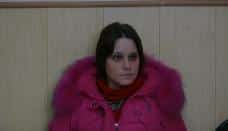 The director Alexander Kuznetsov’s photographer’s eye and immense sensitivity for his subjects are beautifully evident in We’ll Be Alright, which reveals life inside Russian care and court systems. Yulia and Katia, now both adults, have lived their entire lives in care institutions in Siberia. Based on reports written when they were children living in orphanages, they had been labelled as unfit for life in the real world. Their dreams are simple – to gain independence and leave the neuropsychiatric institution that has become their prison – but a long and painful bureaucratic process forces them to meet nearly impossibly high standards for release.
The director Alexander Kuznetsov’s photographer’s eye and immense sensitivity for his subjects are beautifully evident in We’ll Be Alright, which reveals life inside Russian care and court systems. Yulia and Katia, now both adults, have lived their entire lives in care institutions in Siberia. Based on reports written when they were children living in orphanages, they had been labelled as unfit for life in the real world. Their dreams are simple – to gain independence and leave the neuropsychiatric institution that has become their prison – but a long and painful bureaucratic process forces them to meet nearly impossibly high standards for release.
 The voices of women young and old are cause for celebration, inspiration and admiration in another three festival titles. In Erin Heidenreich’s Girl Unbound, the squash player Maria Toorpakai disguises herself as a boy in defiance of a Taliban law forbidding women to play sport. But when she hits puberty her gender is revealed, forcing her to leave her home after repeated death threats to herself and her family. The film follows Maria over several months as she represents Pakistan on the national team standing firm in her mission to carve her own identity and destiny with the support of her progressive father and family.
The voices of women young and old are cause for celebration, inspiration and admiration in another three festival titles. In Erin Heidenreich’s Girl Unbound, the squash player Maria Toorpakai disguises herself as a boy in defiance of a Taliban law forbidding women to play sport. But when she hits puberty her gender is revealed, forcing her to leave her home after repeated death threats to herself and her family. The film follows Maria over several months as she represents Pakistan on the national team standing firm in her mission to carve her own identity and destiny with the support of her progressive father and family.
In The Apology and Child Mother we hear from the largely unheard voices of elderly women who share hidden stories of past exploitations.
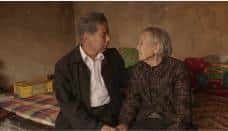 In Tiffany Hsiung’s The Apology, the courageous resolve of Grandma Gil in South Korea, Grandma Cao in China, and Grandma Adela in the Philippines moves them to seize their last chance to share with their families and the world their first-hand accounts of the truth about theirs and others sexual exploitation and imprisonment as so-called “comfort women” by the Imperial Japanese Army during World War II. Despite multiple formal apologies from the Japanese government issued since the early 1990s, there has been little justice. These women seize their last chance to share first-hand accounts of the truth to ensure that this horrific chapter of history is neither repeated nor forgotten.
In Tiffany Hsiung’s The Apology, the courageous resolve of Grandma Gil in South Korea, Grandma Cao in China, and Grandma Adela in the Philippines moves them to seize their last chance to share with their families and the world their first-hand accounts of the truth about theirs and others sexual exploitation and imprisonment as so-called “comfort women” by the Imperial Japanese Army during World War II. Despite multiple formal apologies from the Japanese government issued since the early 1990s, there has been little justice. These women seize their last chance to share first-hand accounts of the truth to ensure that this horrific chapter of history is neither repeated nor forgotten.
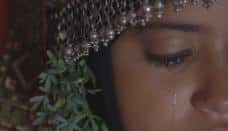 In Ronen Zaretzky and Yael Kipper’s Child Mother, conversations between mothers and their families reveal haunting histories of women forced into marriage as young children. Born into Jewish communities in Yemen and Morocco where child marriage was a culturally sanctioned custom, they were married as young as 12 and began to have babies of their own, often working day and night to support growing families and aging husbands. Through their children’s difficult but enlightening questions, the film exposes an aspect of child marriage and trauma that is rarely discussed: the impact on the family as a whole, an open wound passed on to subsequent generations.
In Ronen Zaretzky and Yael Kipper’s Child Mother, conversations between mothers and their families reveal haunting histories of women forced into marriage as young children. Born into Jewish communities in Yemen and Morocco where child marriage was a culturally sanctioned custom, they were married as young as 12 and began to have babies of their own, often working day and night to support growing families and aging husbands. Through their children’s difficult but enlightening questions, the film exposes an aspect of child marriage and trauma that is rarely discussed: the impact on the family as a whole, an open wound passed on to subsequent generations.
HUMAN RIGHTS WATCH FESTIVAL | Tickets go on sale Friday, 10 February 2017 | @hrwfilmfestival